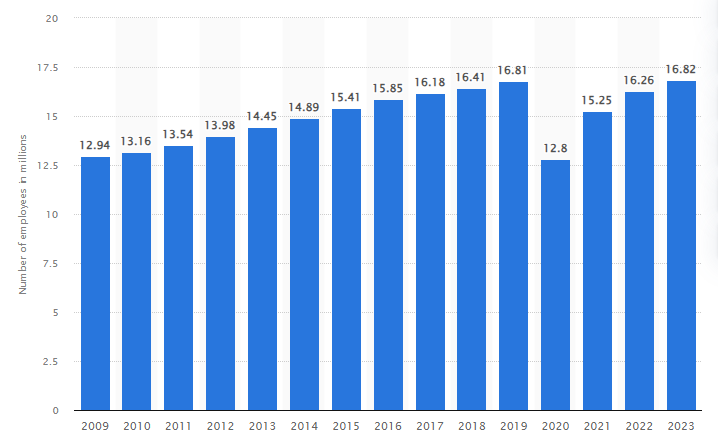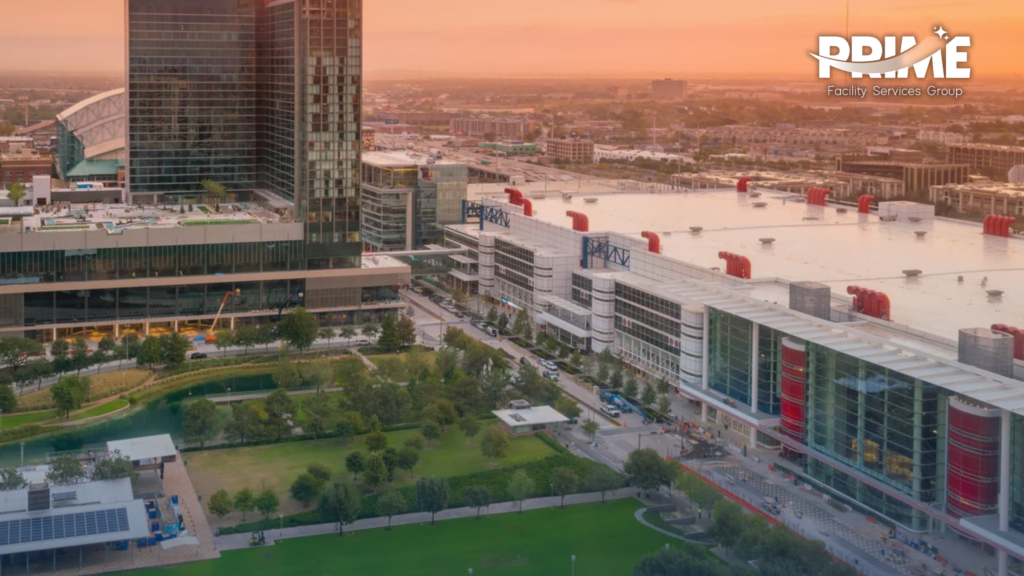In 2024, the hospitality sector is dealing with significant staffing challenges and emerging opportunities.
By Milagros Rodriguez, HR Director at Prime Facility Services.
The role of Human Resources (HR) is more critical than ever in ensuring hotels, resorts, and clubs maintain high service standards and operational efficiency. Recent industry reports highlight significant trends and insights that are shaping the future of HR in hospitality. Here’s an in-depth look at these trends and their implications.

Source: Statista
Key HR Trends in the Hospitality Industry
1. Persistent Hiring Challenges
The hospitality industry continues to face significant hiring challenges. According to a 2024 survey by Hireology, 91% of hotels report difficulties in hiring, with a notable shortage of quality talent. Housekeepers are particularly hard to recruit, cited by 26% of respondents as the hardest positions to fill (Hireology). This persistent challenge underscores the need for effective recruitment strategies and innovative approaches to attract and retain talent.
2. Integration of Advanced Technologies
The adoption of AI and other advanced technologies is revolutionizing the recruitment process in the hospitality sector. These technologies streamline the hiring process by automating initial candidate screenings, improving the accuracy of talent matching, and enhancing overall efficiency. AI tools also assist in personalizing the recruitment experience, ensuring that candidates feel valued and engaged from the outset (Recooty).
3. Emphasis on Soft Skills
In 2024, there is an increasing emphasis on soft skills such as communication, adaptability, and teamwork. The hospitality industry relies heavily on interpersonal interactions and customer service excellence. Therefore, finding candidates with strong soft skills is crucial. Training programs are also evolving to focus more on developing these skills among existing staff, ensuring that they can provide exceptional service and adapt to the dynamic demands of the industry (Recooty).
4. Enhancing Workplace Culture and Flexibility
Creating a positive workplace culture and offering flexible work schedules are key strategies in attracting and retaining employees in the hospitality sector. According to the Labour Market Insights, only 28% of hospitality workers are on full-time hours, highlighting the demand for flexible working arrangements (Labour Market Insights). Employers are increasingly recognizing the importance of work-life balance and are implementing measures to create a supportive and flexible work environment (Recooty).
Industry Insights and Impact
1. Recovery and Growth Post-Pandemic
The hospitality industry is on a path to recovery following the significant disruptions caused by the COVID-19 pandemic. Employment in the travel and tourism sector is expected to reach approximately 320 million individuals in 2023, reflecting a steady growth trend (Statista). However, full recovery is anticipated to take until 2025, indicating that the industry must continue to adapt and innovate in its staffing strategies (STR and Tourism Economics).
2. The Role of HR in Managing Seasonal Fluctuations
Seasonal fluctuations in demand are a common challenge in the hospitality industry. HR departments play a crucial role in managing these fluctuations by maintaining a flexible and scalable workforce. This includes the ability to quickly recruit and deploy temporary staff during peak seasons and reduce staffing levels during off-peak periods without compromising service quality.
3. Addressing Employee Well-Being and Retention
Employee well-being is becoming a central focus in the hospitality industry. High turnover rates have highlighted the need for strategies that enhance job satisfaction and loyalty. Initiatives such as providing career development opportunities, offering competitive benefits, and fostering a positive workplace culture are essential in improving retention rates. Engaging employees and making them feel valued are critical components of a successful HR strategy in hospitality.
Conclusion
The evolving landscape of the hospitality industry in 2024 underscores the vital role of HR in addressing staffing challenges, leveraging technology, and enhancing employee engagement. By focusing on these key trends, hotels, resorts, and clubs can navigate the complexities of the current market and position themselves for long-term success.
At Prime Facility Services, we are committed to staying ahead of these trends and providing our clients with exceptional staffing solutions. Our HR department is dedicated to ensuring that our clients receive the best support, enabling them to maintain high standards and deliver exceptional service to their guests.
For more information about our services, visit Prime Facility Services




